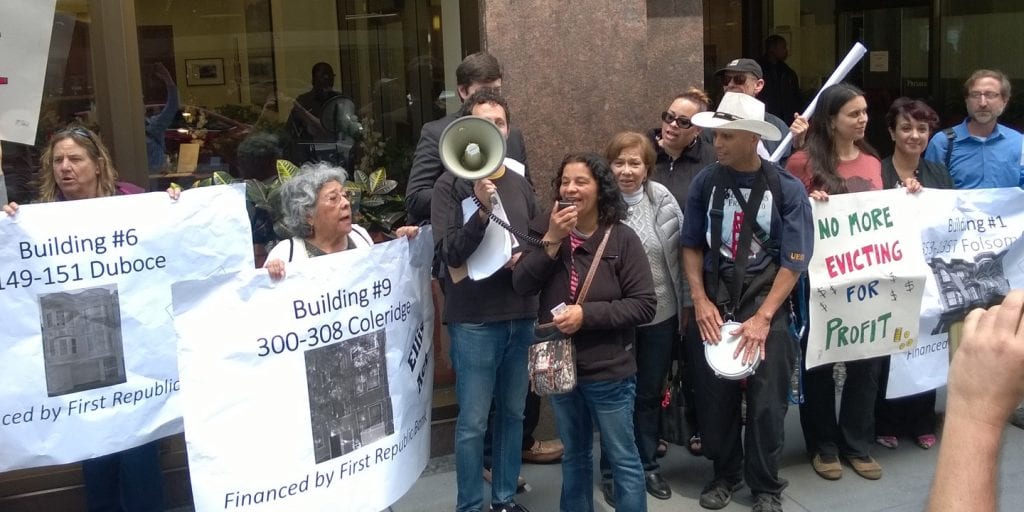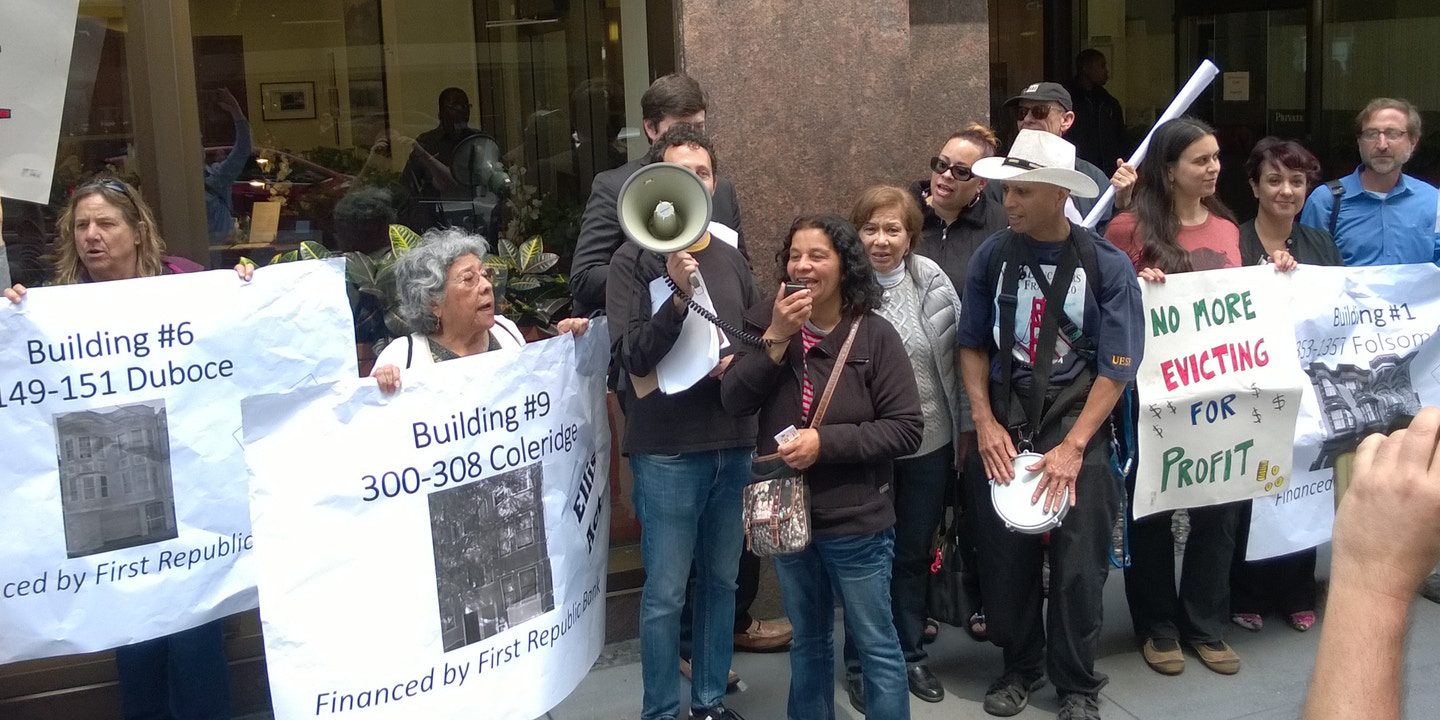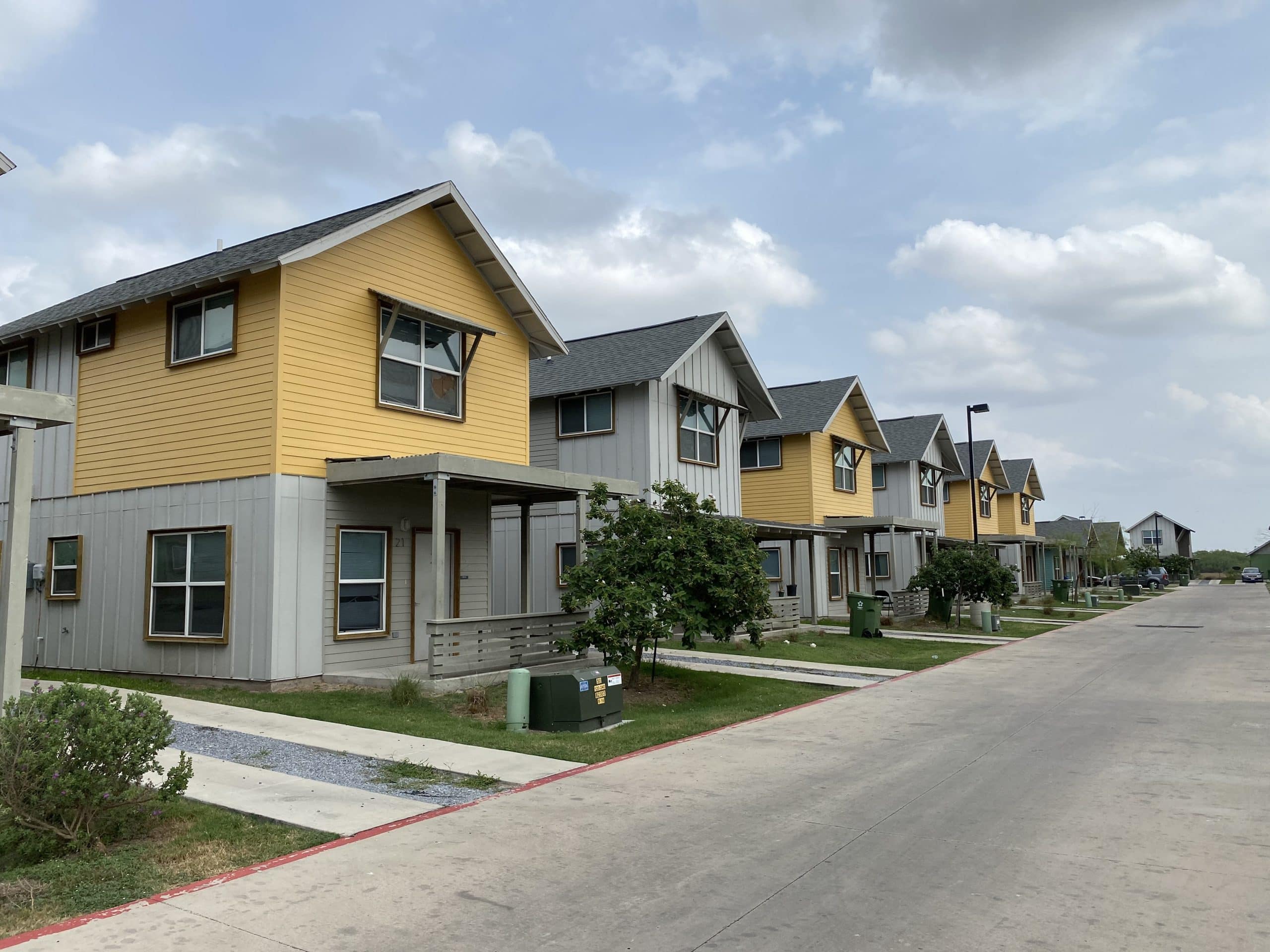
Tenants of different buildings financed by First Republic Bank protest. Photo by Sean Coffey
Over the past five years, hot-market urban centers in the U.S. have experienced a surge in gentrification and subsequent displacement. In places such as Los Angeles, Oakland, Silicon Valley, and San Francisco, the results are clear: long-standing neighborhoods of color are rapidly becoming less so, average working families are rent burdened and squeezed financially, and homelessness is proliferating.
While private developers, tech companies, and greedy landlords are often identified as the usual suspects driving the housing crisis, one group of bad actors is often overlooked: the banks that finance the deals that will foreseeably displace residents. Among them, one San Francisco-based bank has the dubious distinction of being the biggest repeat offender.
Following the Money— First Republic Bank
In the summer of 2015, San Francisco tenant and housing advocates identified a disturbing trend: property speculators were employing the practice of buying rent-controlled buildings, invoking a legal loophole known as the Ellis Act to evict tenants, and then converting the rent-controlled units to what are known as “Tenancies-In-Common” (TICs). TICs are similar to condos but are more complicated because the buyer is buying an ownership stake in a multi-unit building, and that “stake” is the unit they’re buying. Under the Ellis Act, California landlords are able to evict their tenants—despite local rent control laws like those in San Francisco—if the owner claims they are conducting the evictions in order to exit the rental business altogether.
“I have lived in this building and this community for 50 years,” Maritza Osorio, a tenant facing eviction from her San Francisco home said at the time. Osorio, her sister, and other families who lived in their building were being evicted under California’s Ellis Act.
Through research of property records, local advocates determined that while Ellis Act evictions were being carried out by different property owners in different neighborhoods, there was a common theme–many of the building purchases were financed by one institution – First Republic Bank.
When she learned about the role that First Republic played in financing her new landlord and his business model, Maritza Osorio commented, “Banks [that] lend to speculators are not investing in our community or city… they are helping remove people from it.”
As tenant and housing advocates (including CalReinvest, which the authors are part of) dug deeper, we uncovered that local banks were not only enabling and profiting off this displacement, but in some cases may have actually claimed Community Reinvestment Act (CRA) credit for the loans they made in low- and moderate-income neighborhoods on buildings that at the time of origination offered housing at rents affordable to low and moderate income people. But these “displacement mortgages” are the antithesis of community investment—removing affordable units from the community’s housing stock, and displacing low- and moderate-income families while damaging their credit and depleting their resources.
Advocates approached First Republic to speak about the bank’s role in financing the planned eviction of Osorio and her neighbors, and renters in other buildings that First Republic Bank had financed. Tenants and community advocates pressed the bank to alter its lending practices and policies to minimize the potential for displacement financing. After discussions stalled, tenants and housing advocates protested in front of the bank’s headquarters to draw attention to the problem.
During the protest, a representative from First Republic came out to inform protestors that the bank had agreed to implement a new policy of screening out potential borrowers that planned to Ellis Act evict tenants by asking loan applicants to attest to their intentions. The bank also agreed to help finance the purchase of certain at-risk buildings by nonprofit housing developers and land trusts. Though the bank did hold to these promises, our coalition soon realized a broader approach was needed.
The dynamics that led to a sharp increase in Ellis Act evictions and displacement have only intensified. California Reinvestment Coalition and others have documented the extent to which the foreclosure crisis—which disproportionately impacted low-income communities and communities of color—resulted in Wall Street and “cash” investors purchasing REOs (not Oreos) at steep discounts, outbidding working families seeking to buy their first home, subjecting single family renters to poor living conditions and no-fault evictions, and permanently altering neighborhoods.
A sizable portion of the displacement has been financed by banks and other mainstream financial institutions. In 2017, more than 130 organizations joined a letter from the California Reinvestment Coalition, Housing Rights Advocates (HERA) and the Alliance of Californians for Community Empowerment (ACCE) to the Federal Housing Finance Agency (FHFA), urging the agency to halt GSE policies that were enabling or causing displacement.
In 2018, in partnership with the Anti Eviction Mapping Project, we focused on the problem of displacement financing in Oakland. Through interviews with several nonprofit housing, legal service, and organizing groups, as well as analysis of property records and Oakland Rent Board data, we wrote a report documenting that several banks were involved in financing problematic landlords, but the outlier was once again First Republic Bank. Over a multi-year period, the bank made over 500 loans to property owners who subsequently filed more than 500 Rent Board petitions to terminate tenancies, and who also removed a number of rental units from Oakland’s Rent Adjustment Program.
Further evidence of First Republic Bank’s financing of displacement came from other groups in communities throughout the Bay Area, including a legal service group working in communities south of San Francisco. Community Legal Services in East Palo Alto (CLSEPA) was approached by tenants in Redwood City and eastern Menlo Park. Two different owners had purchased two different buildings, but both had moved quickly to dramatically raise rents on their tenants, all of whom are working families and people of color.
CLSEPA attorneys noted that both landlords had loans from First Republic Bank, and had hired the same property management company. When CLSEPA sought to negotiate for the tenants, the property management firm said it would like to help, but that First Republic Bank was making it raise the rents. A review of the loan documents showed that the loans appeared to be underwritten assuming that the rents could and would be raised, and that existing tenants would be forced out. Our members have referred to this dynamic between bank and property owner/borrower as a symbiotic or co-conspiratorial relationship.
First Republic wasn’t the only bank engaged in this financing. For example, First Foundation Bank provided the financing for the acquisition of the Travelers Hotel, a Single Residency Occupant (SRO) hotel in Oakland. The acquisition resulted in the displacement of tenants from the building. When confronted, the bank agreed to meet with community advocates. The ensuing conversation raised the question of what did tenant rights and anti-displacement advocates want from banks?
So, What *Do* Tenants Want?
Instead of funding speculators and displacement, we believe banks can and should play a positive role in our region’s housing crisis, especially in light of their obligations under the Community Reinvestment Act. Working with our allies and members, we developed an Anti-Displacement Code of Conduct. This set of principles outlines practical strategies, like banks not making loans to borrowers with a history of predatory conduct, and committing to implementing a more thorough underwriting process to ensure they are not providing loans that will foreseeably lead to displacement.
The code also directs banks to engage in proactive financing that keeps tenants, homeowners, small businesses, and community institutions in place, such as financing community land trusts, and to target their philanthropy with an anti-displacement lens. Community Land Trusts (CLTs) in particular offer a permanent solution to displacement by preserving affordability and expanding access to ownership for existing residents, yet present access to lender capital for CLTs remains limited.
The code was published last year and has clearly struck a chord, as nearly 100 organizations have signed onto it. Signatories include a number of Community Development Financial Institutions (CDFIs) and nonprofit lenders such as California Capital FDC, Community Vision (formerly NCCLF), Main Street Launch, Nor-Cal FDC, and Opportunity Fund. Additionally, non-lending nonprofits that endorse the code of conduct demonstrate to banks the broad support for these principles and the need for further action. If your organization agrees with these principles and is interested in signing on, we’d love your participation both in signing on and in helping get the word out more broadly.
Foundations and impact investors also have a key role to play in supporting the principles within the code and in addressing this crisis. Many foundations are already funding efforts via partnerships with nonprofits that build affordable housing, work with first-time homebuyers, or provide tenants legal assistance. We’re asking them to take it one step further to fight displacement by both signing on to the code of conduct and by encouraging the financial institutions that hold their deposits and assets to sign the code as well.
The Silicon Valley Community Foundation was the first foundation to sign on and they are also helping leverage their financial relationships to get banks to sign on as well. The foundation agreed to hold an $8 million CD at Community Bank of the Bay (California’s first CDFI bank), if the bank agreed to sign on to the code of conduct, which it did. As the foundation’s CDs at other banks come up for renewal, it will also be asking them to sign on to the code. This is an exciting precedent, which, if followed by other foundations and socially responsible investors, can have a large effect on bank practices, policies, and impact.
Discussions with other banks about the code of conduct are leading to reviews of existing practices, the development of new policies, and consideration of new initiatives. We expect other banks to soon join Community Bank of the Bay in signing on.
While First Republic Bank has not yet agreed to sign on to the code of conduct, we remain hopeful that it will, based on its previous commitment to stop funding mortgages tied to Ellis Act evictions. In the meantime, we are urging nonprofits, individuals, and socially responsible groups to move their money away from banks that refuse to engage on this issue, and into those with anti-displacement values.
We are focused on changing corporate conduct but we are also seeking policy changes, for example by exploring whether our state financial regulator, the Department of Business Oversight, can develop guidance for state chartered banks relating to mitigating displacement financing. In our efforts, we are inspired by the work of allies at Association for Neighborhood and Housing Development for their groundbreaking work on corporate and policy campaigns in New York City.
And, as discussion around Opportunity Zones continues (see for example the recent Shelterforce article, Pushing Opportunity Zones to Fulfill Their Promise), we believe many of the principles in our code of conduct could be implemented in Opportunity Zones to ensure that new development doesn’t result in displacement. Local nonprofit leaders and policymakers could implement their own “Opportunity Zone Codes of Conduct” to ensure that as new investment comes into distressed communities it doesn’t push out long-standing businesses, residents, and homeowners.
On nearly every bank’s website you’ll find a link where they talk about their corporate values and commitment to their communities. Words like integrity, diversity, respect, and do the right thing are used often. We’d like to take them up on that and believe that signing onto the code is a good way for them to put their money where their mouths are.
While we know the Anti-Displacement Code of Conduct won’t solve our region’s housing and displacement problems tomorrow, it has been an effective way to bring attention to the problem of displacement financing, and to engage banks, and all of us, in helping be part of the solution, not part of the problem.





what i would like to see happen is, the money received from buy-out’s not count as income. Tenants are getting screwed by paying extra taxes and moving into a higher income bracket. Those who receive benefits such as medical or disability end up losing their benefits. So no matter what we get screwed by the landlords as well as the government.